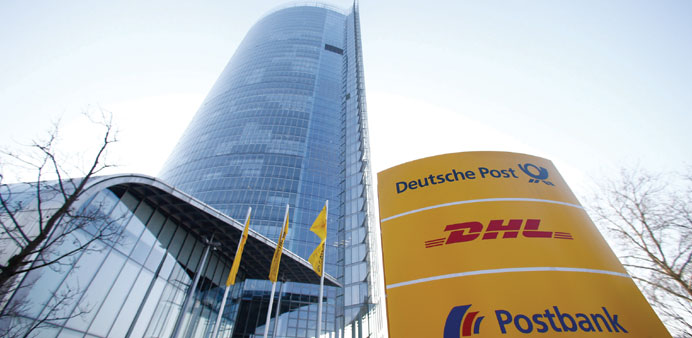The Deutsche Post headquarters stand in Bonn, Germany. Deutsche Post is offering clients in its main European markets a service that can deal with shipping and red tape, as well as delivering to a customer’s door.
Reuters
Deutsche Post is aiming to tap an expected surge in online shopping in developing countries by offering clients in its main European markets a service that can deal with shipping and red tape, as well as delivering to a customer’s door.
Germany’s former postal monopoly is best known internationally for its DHL parcel delivery business, which does the bulk of its work transporting urgent documents and goods from one company to another.
But it is keen to win more work from the global boom in online shopping and believes it can do this by helping internet companies in Europe to get their goods to markets where everything from shipping and local duties to household deliveries can be complicated, time-consuming and expensive. “There are a few countries in the world where the level of delivery service is too low and too poor to build e-commerce business,” Deutsche Post board member Juergen Gerdes said in an interview with Reuters this week, after presenting a study which suggested e-commerce could make up as much as 40% of total global retail sales by 2025 from 8% now.
“We have a few big customers who are looking for better service quality in terms of parcel delivery,” added Gerdes, who heads the company’s Post/eCommerce/Parcel division.
While still focusing on its main European markets, Deutsche Post plans to grow its so-called business-to-consumer business (B2C) in India, and is considering expanding it into China. A spokeswoman declined to identify the company’s customers that are looking to grow beyond Germany and Europe.
But a source familiar with the firm said Zalando, Europe’s biggest online fashion retailer which is considering a possible flotation; Hamburg-based fashion house Tom Tailor ; and family-owned Klingel, which sells clothes, shoes, jewellery and furniture online, were likely to be among them.
Deutsche Post already handles the supply chains for the three companies, from warehouse logistics to returns management.
E-commerce is expanding at breakneck pace, with online retail sales in Europe seen doubling from 2012 levels to around 323bn euros ($438bn) by 2018, market research firm Mintel forecasts.
Fast-growing emerging markets are expected to follow suit.
Deutsche Post, which went public in 2000 and lost its German mail monopoly seven years later, makes three-quarters of group revenues from its DHL logistics business, compensating for the decline in traditional letter deliveries. DHL already has extensive experience in emerging markets through its business-to-business delivery operations.
Its investments of more than $2.5bn in Asia in 2010-2012, including $175mn for its biggest express hub located in Shanghai, started to pay off last year, as it grabbed market share from United Parcel Service and FedEx to fortify its number one position in the region.
However, Deutsche Post is still cautious about venturing into B2C services in China.
“It makes sense to install some activities there. China is one of the biggest countries in the world. It’s a very difficult question if and how we can start some activities there.
It is difficult even though DHL is a dominant player there, as the B2C business has very challenging requirements,” Gerdes said.
While DHL can easily handle the warehousing and incoming goods shipped by containers and planes, deliveries to residential houses that lack zip codes and buyers who want couriers to wait until the recipient has checked whether fashion products ordered are the right size can be daunting.
“Can you just imagine your courier standing there for five minutes while the buyer is trying on (to see) if the shirt fits him?” DHL e-Commerce CEO Thomas Kipp told reporters at a presentation on challenges in emerging markets on Tuesday.
Nonetheless, there is a big opportunity, and Deutsche Post has growth targets to meet.
Kipp said online sales in China were expected to reach 228bn euros in 2018, compared with 75bn last year. Last month, Deutsche Post unveiled medium-term financial goals and forecast annual operating profit to rise by an average of more than 8% through 2020 - due in large part to DHL’s expansion in emerging markets and to e-commerce.

